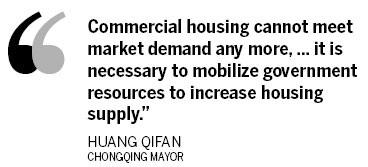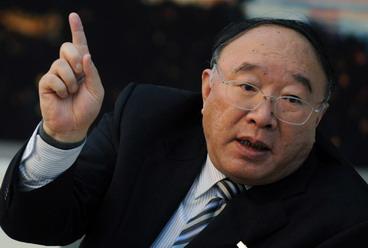

SINGAPORE - Chongqing plans to build some 30 million square meters of public housing for 1.5 million city dwellers over the next three years, in order to tackle an acute housing shortage and stabilize rising property prices, said Huang Qifan, the city's mayor.
"Commercial housing cannot meet market demand any more, it is necessary to mobilize government resources to increase housing supply," Huang told China Daily in Singapore.
Huang led a delegation to the World Cities Summit, a biannual event held in Singapore to discuss good governance and urban solutions for building a livable and sustainable city.
Singapore, a densely populated city-state in Southeast Asia, is seen as a role model worldwide in providing innovative solutions to meet people's rising housing needs amid a rapidly growing population, a critical problem shared by major Chinese cities as the country's urbanization drive accelerates.
"We are learning from Singapore's twin-track mechanism. Besides properties offered by private real estate developers, the government should provide more housing options for residents, as many of them cannot afford to buy from private developers," Huang said.
In Singapore, its public housing authority provides well-designed and affordable homes for some 82 percent of the country's 3.7 million people through granting subsidies to first-home buyers and offering various kinds of home ownership schemes, while high-end apartments are targeted at rich people with their monthly earnings exceeding some $5,750.
As China's largest municipality, Chongqing is under pressure to provide homes for more and more rural people migrating to the city for work. The situation is similar in other major cities, as 15 and 20 million people are migrating to Beijing, Shanghai, and second- and third-tier cities in the mainland every year.
After China launched housing reforms in the late 1990s, commercial real estate developers became the main housing providers on the market, while the limited supply of affordable housing was unable to meet rising demand, driving up the country's property price more than 10 times in the past two decades, Huang said.
The housing problem has become even more acute this year, as frustration over soaring property price intensified in the country's top-tier cities.
Even though the property sales volume nationwide has fallen on the tough government clampdown on runaway property market, prices showed little sign of easing, rising 12.4 percent in May from a year earlier, the second-fastest pace on record.
At a national conference on public housing held in mid-June, Vice-Premier Li Keqiang pledged to step up the supply of public housing nationwide to meet low- and medium-income people's housing needs.
Huang said the city's public housing program, which is targeted at the 30 percent of city dwellers with relatively low incomes, such as rural migrants, will help drive down property prices in the city.
He said the public housing can be rented at a price 40 percent lower than the market level and may even be bought by the leaseholder later at a discounted price.
However, public housing resale is forbidden in the second-hand property market to prevent residents in public housing from making windfall profits via reselling the house at the market price, he noted.





